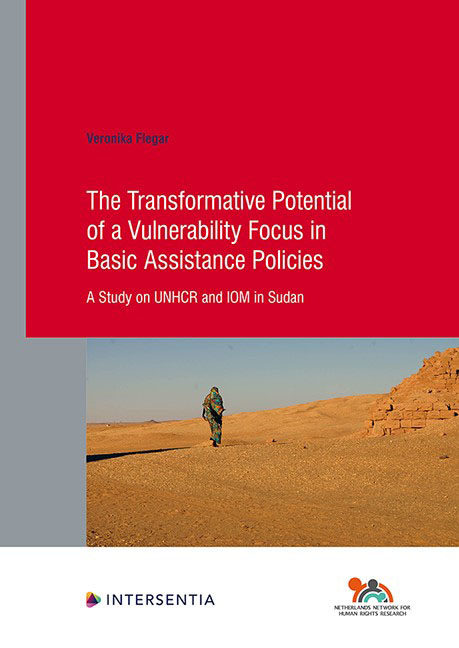 The Transformative Potential of a Vulnerability Focus in Basic Assistance Policies
The Transformative Potential of a Vulnerability Focus in Basic Assistance Policies Book contents
- Frontmatter
- Dedication
- Preface and Acknowledgements
- Contents
- List of Abbreviations
- List of Tables
- List of Figures
- Chapter 1 Introduction
- PART I NORMATIVE AND EMPIRICAL THEORY
- PART II BACKGROUND TO THE CASE STUDIES
- PART III CASE 1: ASSESSING AND ADDRESSING VULNERABILITY AT UNHCR KHARTOUM
- PART IV CASE 2: ASSESSING AND ADDRESSING VULNERABILITY AT IOM KHARTOUM
- PART V
- Bibliography
- Samenvatting
- Summary
- About the Author
- Human Rights Research Series
Chapter 5 - Background on the Republic of Sudan
Published online by Cambridge University Press: 11 November 2021
- Frontmatter
- Dedication
- Preface and Acknowledgements
- Contents
- List of Abbreviations
- List of Tables
- List of Figures
- Chapter 1 Introduction
- PART I NORMATIVE AND EMPIRICAL THEORY
- PART II BACKGROUND TO THE CASE STUDIES
- PART III CASE 1: ASSESSING AND ADDRESSING VULNERABILITY AT UNHCR KHARTOUM
- PART IV CASE 2: ASSESSING AND ADDRESSING VULNERABILITY AT IOM KHARTOUM
- PART V
- Bibliography
- Samenvatting
- Summary
- About the Author
- Human Rights Research Series
Summary
This chapter provides background information on the Republic of Sudan and, in particular, on the migration situation in the country at the time of research. Since this study is not focused on Sudan as such but is merely interested in how Sudan as operational environment impacts the design and implementation of the vulnerability assessments by UNHCR and IOM, this chapter only provides a concise overview of key issues.
The chapter covers three topics that are of particular importance for understanding the present study's findings and arguments: the socio-cultural, political and economic context of Sudan in general (5.1), the engagement of Sudan with the international community (5.2) and the migration situation in Sudan (5.3).
THE SOCIO-CULTURAL, POLITICAL AND ECONOMIC CONTEXT OF SUDAN
THE SOCIO-CULTURAL CONTEXT
Sudan gained independence from Egypt and Great Britain in 1956. Several civil wars ensued, most prominently in the western (Darfur) and southern regions of Sudan. Large parts of Sudan are characterised by a nomadic and tribal society. Although none of the recent conflicts in Sudan is exclusively due to ethnic, tribal or religious tensions, such tensions played (and continue to play) a major role: in Darfur the conflict manifested itself along the lines of Arab nomads on one side and African farmers on the other side while in southern Sudan the line of tension before the secession was primarily between Christians and Muslims.
The conflict in Darfur started in 2003 and, despite lower intensity, remained ongoing at the time of research. The conflict in the southern part of Sudan led to the secession of South Sudan through a referendum in 2011 but instability in the border region remains. Over the past ten to fifteen years the Eastern and Northern parts of Sudan have recovered and stabilised. The security situation in Khartoum remained largely unaffected by these conflicts at the time of research but their impact was felt through the large number of displaced persons arriving and residing in Khartoum (see below).
Since the secession of South Sudan, Islam remains the predominant religion in Sudan with 95.3% of the Sudanese identifying as Muslim. Although other religions are generally accepted in Sudan, atheism was subject to capital punishment at the time of research.
- Type
- Chapter
- Information
- The Transformative Potential of a Vulnerability Focus in Basic Assistance PoliciesA Study on UNHCR and IOM in Sudan, pp. 111 - 128Publisher: IntersentiaPrint publication year: 2020


